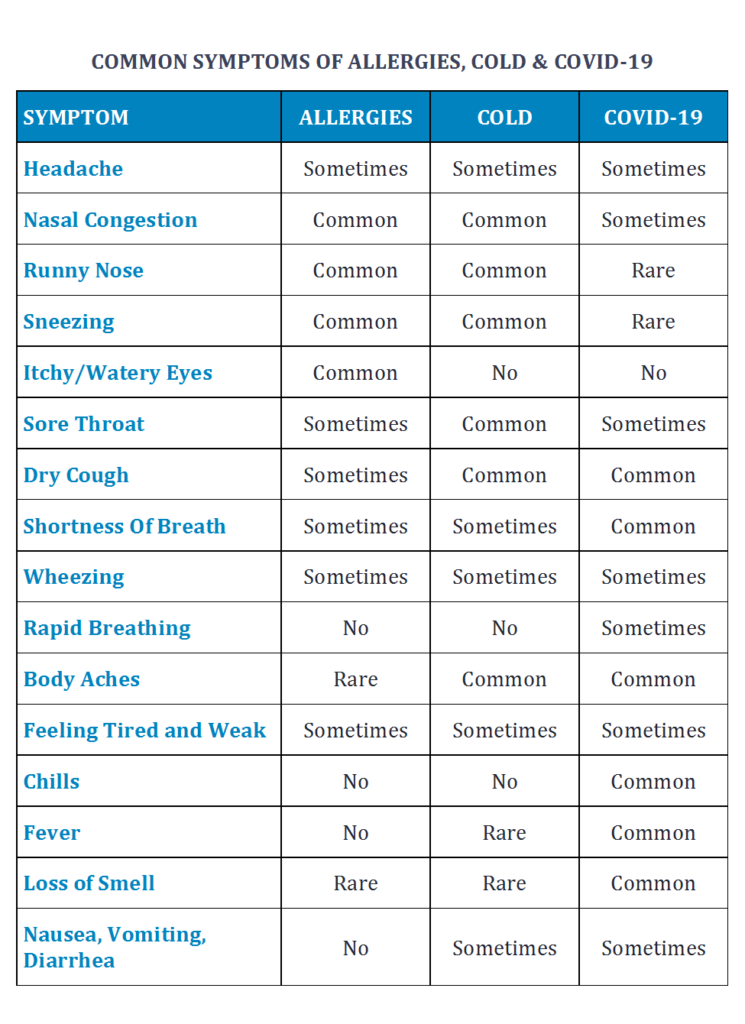Start of Main Content
Allergies
Seasonal allergies can be uncomfortable, frustrating, and even concerning as we all try to stay healthy. While allergies seem unavoidable, there are steps you can take to prevent severe symptoms and give yourself peace of mind.Symptoms: Allergy symptoms may vary and can range from mild to severe. Some people get seasonal allergies for only a few days a year, while others have chronic allergies that require close attention. The most common seasonal allergy symptoms include:
- Itchy or watery eyes
- Post-nasal drip
- Mild fatigue
- Itchy nose or ears
- Sneezing
- Runny or stuffy nose
Treatments: The most common treatments for seasonal allergies are over-the-counter medications and antihistamines. For chronic allergies, doctors may recommend a daily medication to prevent severe flare-ups. In addition, reducing your contact with allergens can help avoid triggering your symptoms. Actions like staying indoors when the pollen count is high, removing clothes that have been worn outside when you return home, and using air conditioning with high-efficiency filters can help prevent allergies indoors. While the occasional allergy symptom is not cause for concern, you should contact your Atrius Health provider if allergies start to affect your day-to-day life.
The Common Cold
As the name suggests, many people suffer from the common cold. While most adults develop 2-3 colds a year, you may not expect to get a cold while taking COVID-19 precautions. Although there is no cure for the common cold, there are a few ways to prevent infection and ease symptoms.Symptoms: Symptoms of the common cold vary depending on the severity of infection. Symptoms usually occur around 3 days after infection, and often include:
- Runny or stuffy nose
- Sore throat
- Cough
- Congestion
- Slight body aches or a mild headache
- Sneezing
- Low-grade fever
- Generally feeling unwell (malaise)
Treatments: The most popular treatments are over-the-counter cold medications and at-home remedies. To reduce your risk of infection, it’s important to practice good personal hygiene, including washing your hands, avoiding contact with those who are sick, and eating healthy foods. Let your Atrius Health provider know if symptoms worsen or last longer than 10 days, as this may be a sign of more serious illness.
COVID-19
COVID-19 is a highly contagious virus transmitted by close-range aerosols and respiratory droplets that can be produced through coughing, sneezing, and talking. Symptoms typically begin 2-14 days after exposure, but you may also never show symptoms, so it’s important to maintain proper social distancing efforts, wear masks, and get tested after known or suspected exposure.Symptoms: Symptomatic cases of COVID-19 vary greatly depending on the person. While one individual may simply experience mild, flu-like symptoms, another may be sick enough to require hospitalization. The most commonly reported symptoms include:
- Fever
- New, worsened or unexplained respiratory symptoms including a cough, congestion, wheezing, shortness of breath, or sore throat
- Sudden loss of smell and taste
- Extreme fatigue
- New onset or worsening of diarrhea
Treatment: Although there is currently no cure for COVID-19, there are several measures that you can take to prevent infection or mitigate symptoms. If you do get diagnosed with COVID-19, it’s important to remain hydrated, keep your fever down with over-the-counter medications such as acetaminophen, and monitor your oxygen levels if you experience shortness of breath. Because many people are asymptomatic when they develop COVID-19, wearing a mask, social distancing, and maintaining good hygiene is crucial to curbing the spread of the virus. And while the vaccine is very effective at preventing severe cases of COVID-19, it’s possible to get the virus even after vaccination. For this reason, proper precautions and the CDC guidance should still be followed after you have received your vaccine.
Key Differences
There are a few ways to determine if you are suffering from seasonal allergies, the common cold, or COVID-19. First, look at your history with allergies – do you get seasonal allergies every year? Can you identify an environmental trigger for your allergies? If these things are true, and if your symptoms often improve after taking medication, you might be suffering from seasonal allergies. Another key difference between COVID-19 and allergies is itchiness. Patients with seasonal allergies often experience itchiness in their nose and face, which is not a reported symptom of COVID-19. The below chart is a quick overview of information on differences in symptoms between colds, allergies and COVID-19. (And additional information about symptoms related to seasonal flu and asthma can be found here.) A main difference between COVID-19 and the common cold is diarrhea and sudden loss of taste and smell, which aren’t usual cold symptoms. However, there are many other symptoms that overlap, so the CDC recommends getting tested for COVID-19 after the onset of any concerning symptoms or after known exposure.
A main difference between COVID-19 and the common cold is diarrhea and sudden loss of taste and smell, which aren’t usual cold symptoms. However, there are many other symptoms that overlap, so the CDC recommends getting tested for COVID-19 after the onset of any concerning symptoms or after known exposure.
This can be a stressful time for seasonal allergy sufferers, kids returning to in-person learning, or anyone who develops cold-like symptoms. However, it’s essential to remain calm, identify potential triggers and continue healthy habits to ensure you minimize your risk of illness. If you have any concerns about your symptoms or think you have been exposed to COVID-19, your Atrius Health provider can guide you towards the right plan of action.


